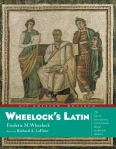Ovid’s collection of elegies, Amores (Loves), abounds with double entendres. Although it is a stitch in Latin, it can seem dry in English even in the hands of an expert translator. On the other hand, Ovid’s masterpiece, Metamorphoses, his epic collection of transformation myths, is vivacious and bubbly in translation. Epic is more straightforward, and Metamorphoses has influenced centuries of English poetry and art, while the elegies portray the pursuit of love in an exotic ancient world.
I have been rereading Ovid’s charming Latin elegies, and decided to translate Amores, II.iii, to give you a glimpse of Ovid’s world. It is the second of two monologues addressed to a eunuch who is his mistress’s chaperone.
The persona of the poem tells the eunuch that, if he had been able to enjoy the “mutual joys of Venus,” he would have sanctioned his mistress’s affair with Ovid. But Ovid also subtly derides the eunuch’s sexual impotence: he uses words like mollis (soft) and facilis (yielding), similar to Catullus’s slangy references to not being durus (hard). Ovid advises the eunuch to implere (fill) the mistress with kindness. Will the eunuch yield or resist?
Here is my literal translation of the poem.
Amores, II.iii
Oh! You are neither male nor female
who guard my mistress, and you cannot
know the mutual joys of Venus (love).
The man who first gelded boys
should suffer the wounds he dealt.
If your love had grown warm
in any woman, you would be soft in compliance,
you would yield to those asking.
You were not born for the war horse,
or useful with brave weapons:
A warlike spear did not fit in
your right hand. Let the masculine men
manage wars. Put away virile hopes;
you must instead bear
the standards of your mistress.
Fill her with kindness, and her friendship
will profit you. If you lose your mistress,
what use will you be? Her beauty –
these are years fit for sexual sport – and
figure are unworthy to die in sluggish abstinence.
She could deceive you, though you are troublesome
What two have wished for they will get.
But it is more fitting to have made a request :
we ask you while you still have
an opportunity to place your favors well, with a good return.
